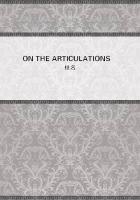Lastly,seeing it hath been already proved out of diverse evident places of Scripture,in the thirty-fifth Chapter of this book,that the kingdom of God is a civil Commonwealth,where God Himself is sovereign,by virtue first of the Old,and since of the New,Covenant,wherein He reigneth by His vicar or lieutenant;the same places do therefore also prove that after the coming again of our Saviour in his majesty and glory to reign actually and eternally,the kingdom of God is to be on earth.But because this doctrine,though proved out of places of Scripture not few nor obscure,will appear to most men a novelty,I do but propound it,maintaining nothing in this or any other paradox of religion,but attending the end of that dispute of the sword,concerning the authority (not yet amongst my countrymen decided),by which all sorts of doctrine are to be approved or rejected;and whose commands,both in speech and writing,whatsoever be the opinions of private men,must by all men,that mean to be protected by their laws,be obeyed.For the points of doctrine concerning the kingdom of God have so great influence on the kingdom of man as not to be determined but by them that under God have the sovereign power.
As the kingdom of God,and eternal life,so also God's enemies,and their torments after judgement,appear by the Scripture to have their place on earth.The name of the place where all men remain till the resurrection,that were either buried or swallowed up of the earth,is usually called in Scripture by words that signify under ground;which the Latins read generally infernus and inferi,and the Greeks ades;that is to say,a place where men cannot see;and containeth as well the grave as any other deeper place.But for the place of the damned after the resurrection,it is not determined,neither in the Old nor New Testament,by any note of situation,but only by the company:as that it shall be where such wicked men were,as God in former times in extraordinary and miraculous manner had destroyed from off the face of the earth:as for example,that they are in Inferno,in Tartarus,or in the bottomless pit;because Corah,Dathan,and Abiram were swallowed up alive into the earth.
Not that the writers of the Scripture would have us believe there could be in the globe of the earth,which is not only finite,but also,compared to the height of the stars,of no considerable magnitude,a pit without a bottom;that is,a hole of infinite depth,such as the Greeks in their demonology (that is to say in their doctrine concerning demons),and after them the Romans,called Tartarus;of which Virgil says,Bis patet in praeceps,tantum tenditque sub umbras,Quantus ad aethereum coeli suspectus Olympum:for that is a thing the proportion of earth to heaven cannot bear:but that we should believe them there,indefinitely,where those men are,on whom God inflicted that exemplary punishment.
Again,because those mighty men of the earth that lived in the time of Noah,before the flood (which the Greeks called heroes,and the Scripture giants,and both say were begotten by copulation of the children of God with the children of men),were for their wicked life destroyed by the general deluge,the place of the damned is therefore also sometimes marked out by the company of those deceased giants;as Proverbs,21.16,"The man that wandereth out of the way of understanding shall remain in the congregation of the giants,"and Job,26.5,"Behold the giants groan under water,and they that dwell with them."Here the place of the damned is under the water.And Isaiah,14.9,"Hell is troubled how to meet thee"(that is,the King of Babylon)"and will displace the giants for thee":and here again the place of the damned,if the sense be literal,is to be under water.
Thirdly,because the cities of Sodom and Gomorrah,by the extraordinary wrath of God,were consumed for their wickedness with fire and brimstone,and together with them the country about made a stinking bituminous lake,the place of the damned is sometimes expressed by fire,and a fiery lake:as in the Apocalypse,21.8,"But the timorous,incredulous,and abominable,and murderers,and whoremongers,and sorcerers,and idolaters,and all liars,shall have their part in the lake that burneth with fire and brimstone;which is the second death."So that it is manifest that hell fire,which is here expressed by metaphor,from the real fire of Sodom,signifieth not any certain kind or place of torment,but is to be taken indefinitely for destruction,as it is in Revelation,20,at the fourteenth verse,where it is said that "Death and hell were cast into the lake of fire";that is to say,were abolished and destroyed;as if after the day of judgement there shall be no more dying,nor no more going into hell;that is,no more going to Hades (from which word perhaps our word hell is derived),which is the same with no more dying.
Fourthly,from the plague of darkness inflicted on the Egyptians,of which it is written,"They saw not one another,neither rose any man from his place for three days;but all the children of Israel had light in their dwellings";the place of the wicked after judgement is called utter darkness,or,as it is in the original,darkness without.
And so it is expressed where the king commandeth his servants,"to bind hand and foot the man that had not on his wedding garment and to cast him into,"eis to skotos to exoteron "external darkness,"or "darkness without":which,though translated "utter darkness,"does not signify how great,but where that darkness is to be;namely,without the habitation of God's elect.















